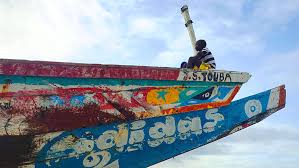The state of emergency declared by the authorities in Senegal to curb the spread of the coronavirus has slowed down the dynamics of artisanal fishing systems in the country, argues Rouguyatou Ka, a Junior Researcher at the Prospective Agricultural and Rural Initiative (IPAR).
By Abdourahmane Diallo
“The measures taken to mitigate the health shock in Senegal, notably the state of emergency and the closing of borders, had particularly upsetted the functioning of the country’s traditional fishing systems, and the Senegalese economy,” Ms. Ka points out in a contribution to APA on Tuesday.
She says artisanal fishing systems are dependent on a set of conditions, including the free movement of fishermen in Senegalese maritime waters, access to landing centers at certain times, the fluidity of inter-regional, inter-territorial and airport transport systems.
These conditions have all been called into question by the various measures taken to stem the spread of the virus across the country, according to her.
She says the usual strategy of fishermen which is to set sail in the middle of the night and disembark early in the morning on fishing docks, in order to ensure the smooth running of the fisheries industry in the hinterland has been limited by the curfew imposed between 8 p.m. and 6 a.m. (since May 1, it has gone from 9 p.m. to 5 a.m.).
To this was added the partial closure and alternative opening of fishing docks and landing spaces for the benefit of disinfection and cleaning operations, she explains.
All things that make the geographer say of the territorial dynamics that “the ‘vulnerability’ of fishermen is thus acted on as we know that the virus was introduced into Senegal during the fishing season and that the actors of artisanal fishing, otherwise totally dependent on banks to finance inputs, had already contracted loans which they will have to pay back by crook or be hook” she writes.
“Thus, the lives of over 70,000 fishermen (DPM, 2018) are mortgaged by the Covid-19,” she laments.
Ms Ka, PhD student at Gaston Berger University in Saint-Louis (north), says the setbacks of the state of emergency are just as heavy on the dynamics of artisanal fisheries systems (SHA).
And as she points out, the internal fish wholesale systems were which supplying nearly 43 percent of fresh fisheries products to the Dakar region and ensuring the routing and distribution of a sizeable part of processed and fresh products across the country are now at a standstill.
As a result, certain fish-farming systems depending on these inter-territorial fishing dynamics are brought to a halt.
According to the IPAR researcher, this situation that benefits the factories exporting frozen fish that fill their stocks, and the Dakar region which seems fairly well protected from the crisis in the sector by the existence of fishing centers is no less important.
The other segment affected by this crisis is that of artisanal processing, which occupies 92 percent of the export market for SHA with an essentially sub-regional orientation (52 percent).
Based on all these observations, she concludes that “the setbacks inherent in the Covid-19 crisis are read in the SHA in terms of poor sales, access difficulties and food and socio-economic insecurities.…and that an uncertain post-Covid-19 scenario is emerging in Senegalese artisanal fishing centers.”
“It is (therefore) essential to anticipate the economic crisis which is looming on the horizon to avoid certain catastrophic scenarios which would require financially cumbersome responses to be committed, considering the low budget allocations that the state has always agreed to allocate to the sector,” Rouguyatou Ka suggests.
ARD/te/fss/as/APA


